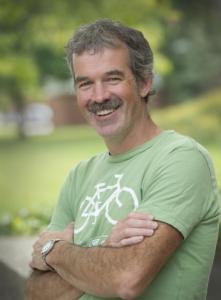 |
John CantPosition/Title: Professor email: jcant@uoguelph.ca Phone: (519) 824-4120 ext. 56222 Office: ANNU 239
|
John grew up in the 1970’s on an 11-acre, self-sufficient farm outside Sackville, New Brunswick. Working on a cow-calf operation next door, with a few sows farrow-to-wean, inspired him to enroll in Animal Science at the Nova Scotia Agricultural College. The fledgling school had no graduate students so undergrads conducted research projects. One of his professors, named Alan Fredeen, encouraged him to apply to the University of California at Davis for graduate studies. There, under the supervision of Ed DePeters and Lee Baldwin, he studied a dietary fat-induced milk protein depression and learned mathematical modelling. in 1996, after a postdoctoral stint with Brian McBride at the University of Guelph, where he built a computer model to predict lactational performance of the dairy cow for Agribrands Purina, he was hired as a faculty member in the Department of Animal and Poultry Science, now Animal Biosciences. His research has focussed on the regulation of milk synthesis and the transformation of dietary nutrients into milk.
Academic History
- B.Sc. (Agr.), Animal Science, Nova Scotia Agricultural College (1986)
- M.S., Animal Science, University of California at Davis (1990)
- Ph.D., Nutrition, University of California at Davis (1992)
Affiliations and Partnerships
- Centre for Nutrition Modelling
- Canadian Society of Animal Science Member
- American Dairy Science Association Member
- Philosophy of Science Association Member
Teaching
- ANSC*4470 Animal Metabolism
- A study of how regulation of the main pathways of carbohydrate, lipid and amino acid metabolism in gut, liver, muscle, adipose and mammary glands is coordinated so that farm animals may grow and lactate under a wide range of environmental influences.
- ANSC*6030 Modelling Metabolic Processes
- Hands-on building and testing of dynamic, mathematical models of metabolic systems using continuous simulation software. In addition, we will examine published models considering phenomena such as distribution in space and chaos. The orientation of models selected for study is towards an improvement in understanding of biological systems currently being studied by experimentation.
- ANSC*6460 Lactation Biology
- An in-depth systems analysis of lactation, comparing the cow, pig, rat, human and seal. Mammary anatomy and development from conception through to lactogenesis, lactation and involution will be covered. Hypotheses of hormonal and nutritional regulation of the biochemical pathways of milk synthesis will be tested in relation to experimental observations.
Current Research Projects
John supervises a dynamic group of students who use a combination of in vivo, in vitro, and in silico techniques to study the physiological and biochemical regulation of milk synthesis in dairy cows, and the metabolic consequences of cows’ milk consumption in animals. John teaches animal metabolism and conducts research with a systems biology approach where whole-animal function is explained as a consequence of biochemical activities in individual cells. His lab makes measurements of milk protein, fat and lactose synthesis in mammary cells, or cell-free preparations, or in the udders of cows infused intra-arterially, intravenously or abomasally with nutrients to develop hypotheses that explain effects of the cow’s diet and physiological state on milk yield and composition. These hypotheses are expressed in mathematical form in computer simulation models that can be used to predict how much milk a cow will produce and what the nutritional quality will be. A particular interest is regulation of translation of the milk protein mRNAs by characteristics of the mRNA sequences and by activity state of initiation and elongation factors in the mammary glands. Combining these features with descriptions of milk secretory cell turnover and local control of mammary blood flow provides a systems view of milk synthesis.
Research Team
Current MSc students
- Madison Fox - arginine metabolism in mammary glands and skeletal muscle
- Juan Rivera - feed value of cup plant (Silphium perfoliatum) silage
Current PhD students
- Amanda Fischer - mammary oligosaccharide metabolism
- Patty Kedzierski - precision dairy cattle feeding
- Boning Li - control of mammary metabolism by amino acids
- Carolina Reyes - lactational shifts in glucose/insulin dynamics
Current Post-doctoral fellow
- Dave Innes - precision cattle feeding with artificial intelligence


